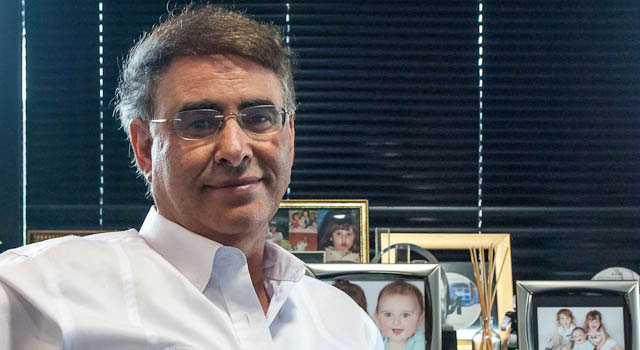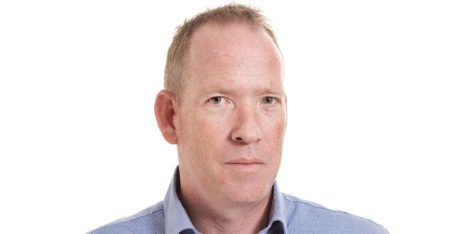
Asher Bohbot, CEO of fast-growing JSE-listed IT services group EOH, arrived in SA from Israel at the age of 27. Born in Morocco but raised in Israel, today Bohbot heads up one of SA’s largest and most respected IT companies as an engineer turned businessman who believes work life and personal life are all part of the same life and that neither should be squandered.
“I spent most of my work life in manufacturing and logistics in various roles,” Bohbot, now 59, tells me over coffee and biscuits in his Bedfordview office, which is decked out with pictures of his children and grandchildren. “At first, I observed the game of IT from the recipient side. I got involved in some IT projects and then had the idea to start a business, a business that is very much what EOH’s model is today: design, build and operate.”
Bohbot says the idea came to him at 3am one morning, whereafter he drew a picture outlining how he thought the company would work. “I asked my employer at the time to become my first customer. A year later they did.” That customer was PG Bison, and it remains an EOH customer to this day.
“It’s about seeing life through the eyes of the customer,” says Bohbot about EOH’s role. “I’m not in IT through-and-through. But what we do in EOH isn’t pure bits and bytes; we understand technology and business and pull them together. It’s the understanding of the customer and their needs that is our focus.”
EOH listed in 1998, just before the JSE’s IT bubble burst. “Listing was meant to create more awareness rather than cashing in,” Bohbot says. “It was more about getting the name better known. We’ve seen many other IT companies coming and going since then. It’s a tough industry; it’s just that simple.”
Bohbot says EOH managed through the “tough times” because it picked up skills, customers and opportunities left by other players exiting the market and because it steered clear of the hype around immature technologies like the Internet in favour of more established approaches to IT. “Everyone was interested in the sexy,” he says. “But we did the so-called ‘mundane’ things.”
The strategy paid off. From 20 staff in 1998, EOH now employs more than 5 000 people. It’s grown from one building to the entire office park in Bedfordview, east of Johannesburg, with 15 offices in Gauteng and more than 100 locations around the country.
“As a listed company we can’t afford to bet the house on new technology. The bulk of our bets should be on the known, the reliable and the expected. That’s what we believe a listed company is – people want to invest for the long-term,” says Bohbot.
“If you want to gamble, you can go to a casino. Some risk is necessary, but not if it makes it a double-or-quits kind of game.”
Asked how he made the leap from industrial engineer to businessman, Bohbot says that, outside of professional qualifications, most education is a “stepping stone for other things”.
“Of the many accountants who qualify every year, not many end up being pure accountants. People move on to other things they’re exposed to. Engineers become managers.”
Bohbot says that although there’s a lot of emphasis on changing jobs more often these days compared to decades gone by, this isn’t always necessary. “I worked for the same company for 17 years, but I got to develop within the company. It shouldn’t be the same year 17 times. Now my advice to people is to grow and develop in one environment, then they don’t have to rebuild their collateral each time, which can be a waste of time. But there are no fixed rules about this,” he says. “I’ve spent 14 years in this job now. That doesn’t mean I’ve had an uneventful business life.”
Bohbot has three children and three grandchildren who fill much of his spare time. He’s also an avid Arsenal supporter, which he says isn’t looking like the best idea given the football clubs’ recent performance.
“I play tennis regularly and a bit of golf. And I sing for leisure in a small group. We’re 10 or so strong and sing folk and traditional songs.”
Bohbot also likes to travel, but being one of six children, and with his siblings and parents still in Israel, he says any trips require that he goes to Israel first “en route to somewhere else”.
The second-oldest child, with an older sister, Bohbot has lived in the same Waverley, Johannesburg home for the past 20 years. “I have the same car, same wife and same children I had before I started EOH,” he says. “I’m a pretty normal guy.”
Bohbot is also a big music fan, which was how he ended up singing. “It’s not classical, though. I like popular music, the music I grew up with.”
A look through the music on his iPhone reveals a list that could just as easily appear in the collection of a man half his age, including Air Supply, Coldplay, Counting Crows, Deep Purple, the Eagles, Guns ‘n Roses, Madonna, the Police and Michael Jackson.
“Old music is timeless. A lot of new music is oversimplified. I hear the things my son listens to and it’s just drums.”
Bohbot says people’s work and personal lives should be equally enjoyable and one shouldn’t be subservient to the other. No one should work only to afford a personal life.
“Work must give joy, too. We tell our people that. Work time still counts as your limited time. Don’t waste it. Enjoyment doesn’t have to mean sitting under a palm tree with two blondes – it’s about adding value to society, developing, growing, solving problems.”
To Bohbot’s mind, setting goals is fine, but life continues once they’re reached and should rather be viewed as a continuous process where the aim should be growth in all senses.
“We’re a listed company and we have to perform financially. That’s a prerequisite of being in business. The objective, though, is to have a pleasant journey in the process.” — (c) 2012 NewsCentral Media




